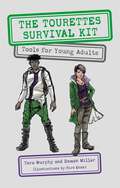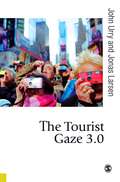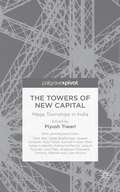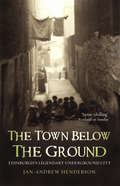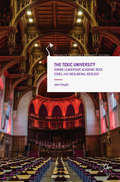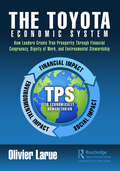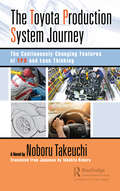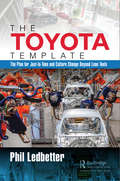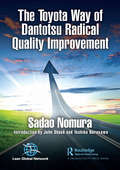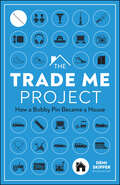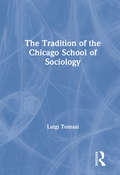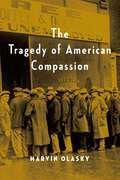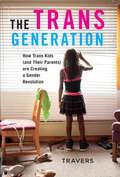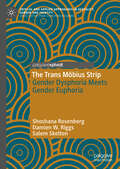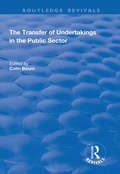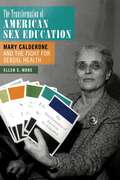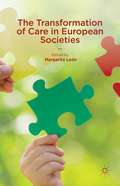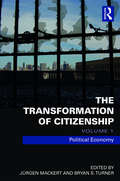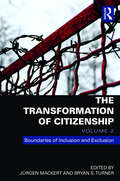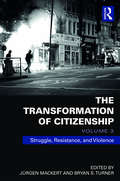- Table View
- List View
The Tourettes Survival Kit: Tools for Young Adults with Tics
by Tara Murphy Damon MillarStruggling to manage your tics in the classroom? Worried about your tics in a job interview or on a first date? This survival kit will give you the tools to survive and thrive in every location - at home, school, work or out with friends. Presenting everyday situations, from schools and exams through to driving and dates, this guide provides simple solutions to common problems and concerns. Dr Tara gives her top tips for managing tics, alongside behavioural therapy techniques for stress management and strategies for coping with commonly co-occurring conditions such as ADHD, OCD and anxiety.
The Tourist Gaze 3.0 (Published in association with Theory, Culture & Society)
by John Urrey Jonas LawsonThe Tourist Gaze, Third Edition restructures, reworks and remakes the groundbreaking previous versions making this successful book even more relevant for tourism students, researchers and designers in the new century. The tourist gaze remains an agenda setting theory, incorporating new principles and research. Packed full of fascinating insights this new edition is fresh and contemporary, intelligently broadening its theoretical and geographical scope and providing a nuanced account which responds to various critiques. The book has been significantly revised to include up-to-date empirical data, many new case studies and fresh concepts. Three new chapters have been added which explore photography and digitization, embodied performances, risks, and alternative futures. Innovative and informative, this book is essential reading for all involved in contemporary tourism, leisure, cultural policy, design, economic regeneration, heritage and the arts.
The Town Below the Ground: Edinburgh's Legendary Undgerground City
by Jan-Andrew HendersonBelow Scotland's capital, hidden for almost two centuries, is a metropolis whose very existence was all but forgotten. For almost 250 years, Edinburgh was surrounded by a giant defensive wall. Unable to expand the city's boundaries, the burgeoning population built over every inch of square space. And when there was no more room, they began to dig down . . . Trapped in lives of poverty and crime, these subterranean dwellers existed in darkness and misery, ignored by the chroniclers of their time. It is only in the last few years that the shocking truth has begun to emerge about the sinister underground city.
The Toxic University: Zombie Leadership, Academic Rock Stars and Neoliberal Ideology (Palgrave Critical University Studies)
by John SmythThis book considers the detrimental changes that have occurred to the institution of the university, as a result of the withdrawal of state funding and the imposition of neoliberal market reforms on higher education. It argues that universities have lost their way, and are currently drowning in an impenetrable mush of economic babble, spurious spin-offs of zombie economics, management-speak and militaristic-corporate jargon. John Smyth provides a trenchant and excoriating analysis of how universities have enveloped themselves in synthetic and meaningless marketing hype, and explains what this has done to academic work and the culture of universities - specifically, how it has degraded higher education and exacerbated social inequalities among both staff and students. Finally, the book explores how we might commence a reclamation. It should be essential reading for students and researchers in the fields of education and sociology, and anyone interested in the current state of university management.
The Toyota Economic System: How Leaders Create True Prosperity Through Financial Congruency, Dignity of Work, and Environmental Stewardship
by Olivier LarueThis book analyzes the purpose and relationship between the different elements of the Toyota Production System (TPS) and how they add up to an economic system rather than just a production system that brings engineering and managerial solutions to businesses. It argues how TPS can be viewed as a science as opposed to a tool-based technique. Our society faces unprecedented economic, social, and environmental challenges. Thankfully, TPS offers solutions. These solutions are born out of Toyota's dissatisfaction with simple cost-benefit analyses and trade-offs. It challenges the antiquated model of economies of scale and radical individual asset efficiency. The Toyota Production System offers technical and managerial innovations that eliminate pre-existing financial, socio-economic, and environmental contradictions. The result is congruency between several factors and agents of our society that have conflicted in the past. Specifically, TPS does the following: Financially, TPS creates congruency between the Income Statement and the Statement of Cash Flow by pursuing total instead of individual efficiency. Socio-managerially, TPS reconciles the creative nature of people with the mundane requirements of modern industrial work by re-introducing craftsmanship into industrial operation. Economically, TPS lessens the conflicts between economic growth and environmental stewardship by eliminating, unevenness, overburden, and waste instead of only chasing economies of scale. These innovations bring financial benefits to the corporation, social benefits to the workers, and economic and environmental benefits to society at large. Each benefit supports the others as opposed to itself individually. The result is true instead of apparent efficiency. This is measurable, repeatable, and worth making into a scientific discipline, which can be taught and applied more widely not just to business haphazardly, but systematically to the broader aspects of our economies.
The Toyota Production System Journey: The Continuously Changing Features of TPS and Lean Thinking
by Noboru TakeuchiThe Toyota Production System (TPS) is regarded as a sophisticated concept that helps us understand the world of manufacturing. It evolved from the system of mass-producing cars, established by Ford, and the Japanese have since endeavored to make their own universal production system. Though much has been accomplished, TPS’ progress is a continuous process. The theme of this book is how to understand and learn TPS. There is a TPS concept that seems to elude many, and that is that manufacturers should be able to make a product available at the moment a customer comes and asks for it. There are various ways and various tools that can be used to pursue the ideal state, and therefore we need to focus on the basic principles of TPS. This book tries to explain those Toyota Production System concepts that may otherwise be elusive. This book focuses on the factory to help readers understand the fundamental ideology of TPS. The main character started his career as a technical expert in the R&D division of an automotive Company and eventually becomes an Instructor of TPS. His broad career in companies is used to vividly describe the form of the Toyota Production System. To explain the growth of apprentices of various titles and positions, this story is woven with several short stories presented from the perspective of the main character, who grows from being a group leader to section leader to manager to general manager. Essentially, this book describes the Toyota Production System as based on the philosophy: “Always sketching out and pursuing the ideal state of manufacturing.”
The Toyota Template: The Plan for Just-In-Time and Culture Change Beyond Lean Tools
by Phillip LedbetterMuch has been written about Toyota over the last 30 years focusing on both its products (superior vehicles), and its operational excellence based on its Toyota Production System (TPS). The Toyota Template details the critical concepts and methods that Taiichi Ohno implemented in developing the Toyota Production System. This book is different, however, regarding the parallels it draws between Toyota’s pre-TPS condition and companies today who are attempting to become more efficient and Lean. In view of efficiency, excellence, culture, and general "Leanness," many organizations are in the same position as Toyota prior to implementing what was once called the "Ohno System." The building of TPS, with the goal to eliminate waste, evolved as problems were encountered and solutions put in place. A wonderful byproduct of these years of work was the growth of a problem-solving culture throughout Toyota that is unique in the business world. Currently, the Toyota Production System is well established. Though constantly improving, the historical picture is visible. The question many have tried to answer for their own companies is "how can they achieve world class efficiency?" The Toyota Template answers this question. This book: Explains the critically important elements of the Toyota Production System. Analyzes the sequence of implementation as the system developed. Places these elements in a logical order of implementation based on the history and current knowledge. In addition, it addresses the effect of each element on the culture. The author was prompted to write this book because of his personal observations of the failure of most attempts to develop Lean systems. What makes Toyota stand out is not any of the individual elements – It is crucially important to have all the elements together as a system. Most attempts have been focused on bits and pieces of the elements, or the tools. The Toyota Template is about the relevance of the Toyota Production System to "any type of business" today. It is not an all-inclusive explanation of every aspect of TPS. Rather, this book succinctly identifies the key elements, places them in a logical, sequential order of implementation, and explains how each contributed to the formation of the Toyota culture.
The Toyota Way of Dantotsu Radical Quality Improvement
by Sadao NomuraIn this book, author Sadao Nomura taps into his decades of experience leading and advising Toyota operations in a wide variety of operations to tell the story of radical improvement at Toyota Logistics & Forklift (TL&F). This book tells in great detail what the author did with TL&F, how they did it, and the dramatic results that ensued. TL&F has long been a global leader in its industry. TL&F is part of Toyota Industries Corporation, which was founded by Toyota Group founder Sakichi Toyoda almost 100 years ago. Sakichi Toyoda is legendary in the Lean community as the originator of the all-important "JIDOKA" pillar of TPS, which ensures 1) built-in quality and 2) respect for people through ensuring that technology works for people rather than the other way around. Although TL&F seemed to be performing well, insiders knew that, as the founding company of the Toyota group, it needed to do better, especially in the quality performance of its global subsidiary operations. But improvement would not be easy in a company that already prided itself in its history as an exemplar in providing highest quality products and services. In 2006, TL&F requested assistance from Sadao Nomura. The initial request was for Mr. Nomura to support quality improvement in three global operations that had become part of TL&F through acquisition: US, Sweden, and France. Improvement was expected at these affiliates, but the dramatic nature of the improvement was not. Further, the improvement activities were so powerful that they were also instituted at the parent operations in Japan. Over a period of almost ten years, the company with the name most associated with product quality experienced quality improvement unparalleled in its history. "Dantotsu" means "extreme," "radical," or "unparalleled."
The Trade Me Project: How a Bobby Pin Became a House
by Demi SkipperCan you turn a bobby pin into a house?This is the question Demi Skipper set out to answer in May 2020, when she posted an ordinary bobby pin to trade on Facebook Marketplace. She had two rules: no trading with anyone she knew, and no spending her own money on trades. Twenty months and 28 trades later, she completed the final trade and took possession of a house. How did she do it? It wasn&’t luck. Hard work, ingenuity, and a talent for negotiation were essential to executing the series of trades that led from the bobby pin to the house. Along the way she sent more than 300,000 messages, enlisted the help of strangers to drive vehicles across the country, and went deep into the world of &“sneakerheads&” in pursuit of the perfect trade, all while documenting her progress and amassing an audience of millions on TikTok.From the crushing disappointments to the surprising successes, Demi shares the behind-the-scenes stories of her first successful trading project and the life lessons she&’s applying as she starts the process again. It&’s an engrossing story for anyone who wonders, How did she do that? Could I do it too?
The Tradition of the Chicago School of Sociology
by Luigi TomasiThe value of the book lies in its reassessment of the distinctive features of the Chicago School, of its contributions in the theoretical and methodological fields and of its influence on the growth of sociology throughout the world and in America in particular. The book pays particularly close attention to the eclectic nature of the research methods used by the Chicago sociologists as they sought to integrate subjective and objective aspects of human life. It demonstrates that this eclecticism formed an integral part of their theories but also emphasises that empirical observation, too, was important, although not as an end in itself. While, for example, they were working on the concepts of organization, marginality and interaction, they did not consider these as ends in themselves but as additions to the development of a more general theoretical approach. Often in the past, and wrongly, Chicago’s theoretical contribution has been restricted to the urban sector. The book clearly and unequivocally reveals how the tendency to see the Chicago School as a 'theoretical' is the result of misinterpretation and of a failure to realize that, for the sociologists of the period, understanding the social dynamics of the city of Chicago was tantamount to interpreting the central tendencies of modern society itself. The book analyzes how empirical observation was important but not an end in itself. The Chicago School developed a profusion of sociological theories in many areas of inquiry and never opted for any one particular approach. The various essays in the book also make it clear that the School decisively contributed to the development of qualitative and quantitative techniques.
The Traditional Ecological Knowledge of the Solega
by Aung SiThis book covers the ethnobiology and traditional ecological knowledge (TEK) of the Solega people of southern India. Solega TEK is shown to be a complex, inter-related network of detailed observations of natural phenomena, well-reasoned and often highly accurate theorizing, as well as a belief system, derived from cultural norms, regarding the relationships between humans and other species on the one hand, and between non-human species on the other. As language-based studies are strongly biased toward investigations of ethno-taxonomy and nomenclature, the importance of studying TEK in its proper context is discussed as making context and encyclopedic knowledge the objects of study are essential for a proper understanding of TEK.
The Traffic in Babies
by Karen BalcomBetween 1930 and the mid-1970s, several thousand Canadian-born children were adopted by families in the United States. At times, adopting across the border was a strategy used to deliberately avoid professional oversight and take advantage of varying levels of regulation across states and provinces. The Traffic in Babies traces the efforts of Canadian and American child welfare leaders--with intermittent support from immigration officials, politicians, police, and criminal prosecutors--to build bridges between disconnected jurisdictions and control the flow of babies across the Canada-U.S. border.Karen A. Balcom details the dramatic and sometimes tragic history of cross-border adoptions--from the Ideal Maternity Home case and the Alberta Babies-for-Export scandal to trans-racial adoptions of Aboriginal children. Exploring how and why babies were moved across borders, The Traffic in Babies is a fascinating look at how social workers and other policy makers tried to find the birth mothers, adopted children, and adoptive parents who disappeared into the spaces between child welfare and immigration laws in Canada and the United States.
The Tragedy of American Compassion
by Marvin OlaskyCan a man be content with a piece of bread and some change tossed his way from a passerby? Today's modern welfare state expects he can. Those who control the money in our society think that giving a dollar at the train station and then appropriating a billion dollars for federal housing can cure the ails of the homeless and the poor. But the crisis of the modern welfare state is more than a crisis of government. Private charities that dispense aid indiscriminately while ignoring the moral and spiritual needs of the poor are also to blame. Like animals in the zoo at feeding time, the needy are given a plate of food but rarely receive the love and time that only a person can give. Poverty fighters 100 years ago were more compassionate--in the literal meaning of "suffering with"--than many of us are now. They opened their own homes to deserted women and children. They offered employment to nomadic men who had abandoned hope and human contact. Most significantly, they made moral demands on recipients of aid. They saw family, work, freedom, and faith as central to our being, not as life-style options. No one was allowed to eat and run. Some kind of honest labor was required of those who needed food or a place to sleep in return. Woodyards next to homeless shelters were as common in the 1890s as liquor stores are in the 1990s. When an able bodied woman sought relief, she was given a seat in the "sewing room" and asked to work on garments given to the helpless poor. To begin where poverty fighters a century ago began, Marvin Olasky emphasizes seven ideas that recent welfare practice has put aside: affiliation, bonding, categorization, discernment, employment, freedom, and most importantly, belief in God. In the end, not much will be accomplished without a spiritual revival that transforms the everyday advice we give and receive, and the way we lead our lives. It's time we realized that there is only so much that public policy can do. That only a richness of spirit can battle a poverty of soul. The century-old question--does any given scheme of help... make great demands on men to give themselves to their brethren?--is still the right one to ask. Most of our 20th-century schemes have failed. It's time to learn from the warm hearts and hard heads of the 19th-century.
The Tragedy of Heterosexuality (Sexual Cultures #56)
by Jane WardWinner, 2021 PROSE Award in the Cultural Anthropology & Sociology CategoryFinalist, 2021 Lambda Literary Award in LGBTQ StudiesA troubling account of heterosexual desire in the era of #MeTooHeterosexuality is in crisis. Reports of sexual harassment, misconduct, and rape saturate the news in the era of #MeToo. Straight men and women spend thousands of dollars every day on relationship coaches, seduction boot camps, and couple’s therapy in a search for happiness. In The Tragedy of Heterosexuality, Jane Ward smartly explores what, exactly, is wrong with heterosexuality in the twenty-first century, and what straight people can do to fix it for good. She shows how straight women, and to a lesser extent straight men, have tried to mend a fraught patriarchal system in which intimacy, sexual fulfillment, and mutual respect are expected to coexist alongside enduring forms of inequality, alienation, and violence in straight relationships. Ward also takes an intriguing look at the multi-billion-dollar self-help industry, which markets goods and services to help heterosexual couples without addressing the root of their problems. Ultimately, she encourages straight men and women to take a page out of queer culture, reminding them “about the human capacity to desire, fuck, and show respect at the same time.”
The Trans Generation: How Trans Kids (and Their Parents) are Creating a Gender Revolution
by TraversWinner, 2019 PROSE Award for Anthropology, Criminology and Sociology, presented by the Association of American Publishers A groundbreaking look at the lives of transgender children and their families Some “boys” will only wear dresses; some “girls” refuse to wear dresses; in both cases, as Travers shows in this fascinating account of the lives of transgender kids, these are often more than just wardrobe choices. Travers shows that from very early ages, some at two and three years old, these kids find themselves to be different from the sex category that was assigned to them at birth. How they make their voices heard—to their parents and friends, in schools, in public spaces, and through the courts—is the focus of this remarkable and groundbreaking book. Based on interviews with transgender kids, ranging in age from 4 to 20, and their parents, and over five years of research in the US and Canada, The Trans Generation offers a rare look into what it is like to grow up as a trans child. From daycare to birthday parties and from the playground to the school bathroom, Travers takes the reader inside the day-to-day realities of trans kids who regularly experience crisis as a result of the restrictive ways in which sex categories regulate their lives and put pressure on them to deny their internal sense of who they are in gendered terms. As a transgender activist and as an advocate for trans kids, Travers is able to document from first-hand experience the difficulties of growing up trans and the challenges that parents can face. The book shows the incredible time, energy, and love that these parents give to their children, even in the face of, at times, unsupportive communities, schools, courts, health systems, and government laws. Keeping in mind that all trans kids are among the most vulnerable to bullying, violent attacks, self-harm, and suicide, and that those who struggle with poverty, racism, lack of parental support, learning differences, etc, are extremely at risk, Travers offers ways to support all trans kids through policy recommendations and activist interventions. Ultimately, the book is meant to open up options for kids’ own gender self-determination, to question the need for the sex binary, and to highlight ways that cultural and material resources can be redistributed more equitably. The Trans Generation offers an essential and important new understanding of childhood.
The Trans Möbius Strip: Gender Dysphoria Meets Gender Euphoria (Critical and Applied Approaches in Sexuality, Gender and Identity)
by Damien W. Riggs Shoshana Rosenberg Salem SkeltonThis book explores the histories and presents of gender dysphoria and euphoria as clinical and theoretical concepts as well as lived experience. It outlines how euphoria emerged as a concept, what its relationship to dysphoria is, and how it shows up in the body, in relationships, and as a framework for liberation. Using the concept of the Möbius Strip as an explanatory model of the interconnectedness of gender, the authors explore how gender as a concept encompasses multiplicity, duality, and non-linearity despite its supposed singularity. Rather than viewing euphoria and dysphoria as two poles of a continuum, this volume introduces the notion that they are in fact a blended experience which oscillates between distinctiveness and relationality. Critically engaging with clinical theory, gender studies, crip theory, spirituality, and political movements, this book is ideal for academics from a variety of fields, including psychology, sociology, gender studies, trans studies, cultural studies, as well as practitioners and clinicians, especially those who work with trans people.
The Transcendence of Desire: A Theology of Political Agency (New Approaches to Religion and Power)
by Tom James David TrueThe “secular age” is not a smooth, untroubled process of accumulation and advance but an uneven and unpredictable series of clashes of interest. Charles Taylor’s “immanent frame” cannot be construed merely as a phenomenon within religion and culture but urgently needs to be understood in political and economic terms–i.e., as a class project. The failure of the secular, vividly displayed in the crumbling legitimacy of global institutions and in the spectacle of police violence, both calls for and makes possible a renewal of political agency. Tom James and David True argue that a theology of the cross has a distinctive potential today: it can pierce the sacred aura of normalcy around the consensual anti-politics of the neoliberal order so that a vision of a world beyond today’s racialized capitalism can emerge. But they contend that we don’t need to forsake the emancipatory aims of modernity nor retreat to local communities. As an alternative to these weak strategies, they offer a constructive and cruciform account of political agency that includes both prophetic resistance and practical wisdom, each embedded in contemporary struggles for freedom that, they argue, embody divine desire for a common world.
The Transfer of Undertakings in the Public Sector (Routledge Revivals)
by Colin BournThis title was first published in 2000: This volume discusses the impact of the transfer of undertakings regime upon the public sector, particularly focusing on the interaction between the protection of employee rights and the restructuring and modernization of public services. The crux of the book is the interaction of market-led policies in the public sector, such as compulsory competitive tendering, best value and the PFI, with the protection of employee rights on the transfer of imployment. It considers the evolving law on the scope of a relevant transfer under the European Acquired Rights Directive and the TUPE regulations, before reviewing the present stte of the law on dismissals, variation of terms, pensions and employee consultation in transfer-related situations. The book incorporates consideration of the text of the 1998 revision of the Acquired Rights Directive.
The Transformation of Academic Work: Fractured Futures? (Palgrave Critical University Studies)
by James Goodman Keiko Yasukawa Claire ParfittThis book offers a unique grounded analysis of recent crises and transformations in academic work. It charts international and Australia-based efforts to overcome academic fragmentation and precarity, and to advance agendas for the public university. It is based on extensive qualitative interviews with academics and managers across several universities in Australia. It finds new grounds for ‘universal’ universities, with decent jobs, to serve the public good. The book is aimed at students and scholars from sociology, education, politics and industrial relations, and a wider readership concerned about the future of universities. Analysis centres on a trade union-led initiative in Australia aimed at decasualising universities, and ensuing debates about the impact of academic fragmentation. The authors argue for strengthening the teaching/research nexus as the foundation-stone for public purpose universities.
The Transformation of American Sex Education: Mary Calderone and the Fight for Sexual Health
by Ellen S. MoreA comprehensive history of the battle over sex education in the United StatesMid-century America had a problem talking about sex. Dr. Mary Calderone first diagnosed this condition and, in 1964, led the uphill battle to de-stigmatize sex education. Supporters hailed her as the “grandmother of modern sex education” while her detractors painted her as an “aging libertine,” but both could agree that she was quickly shaping the way sex was discussed in the classroom. Part biography, part social history, The Transformation of American Sex Education for the first time situates Dr. Mary Calderone at the center of decades of political, cultural, and religious conflict in the fight for comprehensive sex education. Ellen S. More examines Americans’ attempts to come to terms with the vexed subject of sex education in schools from the late 1940s to the early twenty-first century. Using Mary Calderone’s life and career as a touchstone, she traces the origins of modern sex education in the United States from the work of a group of reformers who coalesced around Calderone to create the Sexuality Information and Education Council of the United States (SIECUS) in 1964, to the development and use of the competing approaches known as “abstinence-based” and “comprehensive” sex education from the 1980s into the twenty-first century. A fascinating and timely read, The Transformation of American Sex Education provides a substantial contribution to the history of one of America’s most intense and protracted culture wars, and the first account of the woman who fought those battles.
The Transformation of Care in European Societies
by Margarita LeónThis book aims to explore the nature and extent of the 'care deficit' problem in European societies and how effective the different care systems are in dealing with these problems through policy innovation. It combines theoretical and conceptual debates, cross-national comparisons and analytically-driven case studies.
The Transformation of Citizenship, Volume 1: Political Economy
by Bryan S. Turner Juergen MackertThe Transformation of Citizenship addresses the basic question of how we can make sense of citizenship in the twenty-first century. These volumes make a strong plea for a reorientation of the sociology of citizenship and address serious threats of an ongoing erosion of citizenship rights. Arguing from different scientific perspectives, rather than offering new conceptions of citizenship as supposedly more adequate models of rights, membership and belonging, they deal with both the ways citizenship is transformed and the ways it operates in the face of fundamentally transformed conditions. This volume Political Economy discusses manifold consequences of a decades-long enforcement of neo-liberalism for the rights of citizens. As neo-liberalism not only means a new form of economic system, it has to be conceived of as an entirely new form of global, regional and national governance that radically transforms economic, political and social relations in society. Its consequences for citizenship as a social institution are no less than dramatic. Against the background of both manifest and ideological processes the book looks at if citizenship has lost the basis it has rested upon for decades, or if the institution itself is in a process of being fundamentally transformed and restructured, thereby changing its meaning and the significance of citizens’ rights. This book will appeal to academics working in the field of political theory, political sociology and European studies.
The Transformation of Citizenship, Volume 2: Boundaries of Inclusion and Exclusion
by Bryan S. Turner Jürgen MackertThis volume Boundaries of Inclusion and Exclusion examines the many different and newly emerging ways in which citizenship refers to spatial, symbolic and social boundaries. Today, in the context of citizenship we face processes of inclusion and exclusion on national and supranational level but no less on the level of groups and individuals. The book addresses these different levels and discusses processes of inclusion and exclusion with regard to spatial, social and symbolic boundaries referring to such different problems as political participation, migration, or identity with regard to religion or the EU. This book will appeal to academics working in the field of political theory, political sociology and European studies.
The Transformation of Citizenship, Volume 3: Struggle, Resistance and Violence
by Bryan S. Turner Juergen MackertThis volume Struggle, Resistance and Violence examines the fact that all over the world the rights of citizens have come under enormous pressure and addresses the many ways in which people are ‘making claims’ against both autocratic and democratic authority. Without any doubt rule-breaking, riots and violent upheavals have become an aspect of political struggles for citizenship. The book takes up a conflict perspective that directs attention to these recent phenomena. It stresses the necessity of a careful analysis of resistance and violence as critical factors for coming to terms with social conflicts for citizenship from Europe to South America, as well as the Near East, the Far East and the Arab World.
